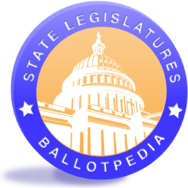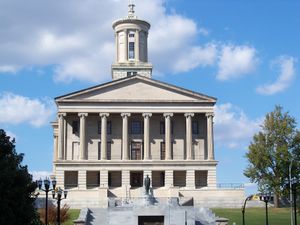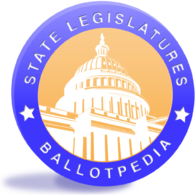Help us improve in just 2 minutes—share your thoughts in our reader survey.
2018 Tennessee legislative session
 |
| 2018 legislative sessions coverage |
|---|
| Tennessee General Assembly | |
 | |
| General information | |
| Type: | State legislature |
| Term limits: | None |
| Session start: | January 9, 2018 |
| Session end: | April 27, 2018 |
| Website: | Official Legislature Page |
| Leadership | |
| Senate President: | Randy McNally (R) |
| House Speaker: | Beth Harwell (R) |
| Majority Leader: | Senate: Mark Norris (R) House: Glen Casada (R) |
| Minority Leader: | Senate: Lee Harris (D) House: Craig Fitzhugh (D) |
| Structure | |
| Members: | 33 (Senate), 99 (House) |
| Length of term: | 4 years (Senate), 2 years (House) |
| Authority: | Art III, Tennessee Constitution |
| Salary: | $22,667/year + per diem |
| Elections | |
| Redistricting: | Tennessee General Assembly has control |
Meeting place: | |
This page provides an overview of the 2018 Tennessee General Assembly and its general and special sessions. The timelines below contain noteworthy events from the sessions curated by Ballotpedia throughout the year.
If you know of any additional events that should be added to this page, please email us at editor@ballotpedia.org.
Overview
In 2018, the Tennessee General Assembly was in session from January 9, 2018, through April 27, 2018.
Partisan control
Tennessee was one of 26 Republican state government trifectas in 2018. A state government trifecta occurs when one political party holds the governor's office, a majority in the state Senate, and a majority in the state House. For more information about state government trifectas, click here.
The following tables show the partisan breakdown of the Tennessee General Assembly in the 2018 legislative session.
Senate
| Party | As of July 2018 | |
|---|---|---|
| Democratic Party | 5 | |
| Republican Party | 28 | |
| Vacancies | 0 | |
| Total | 33 | |
House
| Party | As of July 2018 | |
|---|---|---|
| Democratic Party | 25 | |
| Republican Party | 73 | |
| Vacancies | 1 | |
| Total | 99 | |
Leadership in 2018
Senate
- Senate president: Randy McNally (R)
- Senate president pro tempore: Ferrell Haile (R)
- Majority leader: Mark Norris (R)
- Minority leader: Lee Harris (D)
House
- Speaker of the House: Beth Harwell (R)
- Majority leader: Glen Casada (R)
- Minority leader: Craig Fitzhugh (D)
Regular session
Status of legislation at the end of the regular session
This table details the status of legislation covered on this page at the end of the regular session.
| Status of legislation at the end of the 2018 regular session | |||
|---|---|---|---|
| Legislation | Subject area | Actions during the regular session | Status at the end of the regular session |
| HB 0108 | Offer women the opportunity to see the results of pre-abortion ultrasounds | Passed House Passed Senate |
Governor signed |
| HB 2586 | Reduce penalty for permit-less gun carry | Passed House | Did not see further action |
| HB 2251 | Prohibit TennCare payments to abortion providers | Passed House Passed Senate |
Governor signed |
| HB 1551 | Require work and job training for TennCare recipients | Passed House Passed Senate |
Governor signed |
| HB 2315 | Ban sanctuary cities | Passed General Assembly | Became law without governor's signature |
| HB 2644 | Budget | Passed General Assembly | Governor signed |
February 12, 2018
Tennessee House of Representatives approves bill related to pre-abortion ultrasounds
The Tennessee House of Representatives voted 74-20 to approve a bill requiring healthcare providers who perform pre-abortion ultrasounds to offer the woman the opportunity to learn the results. If the woman chose to see the results, healthcare providers were directed to inform her of the presence or absence of a fetal heartbeat. The bill also required the state Department of Health to include data on heartbeat detection and abortion methods in its annual report. Following passage in the House, the bill was sent to the Senate for approval.[1][2]
- Update: The state Senate approved the legislation on April 18, 2018, and Gov. Bill Haslam (R) signed it on May 3, 2018.
March 5, 2018
State House approves bill to reduce penalty for permit-less gun carry
The Tennessee House of Representatives approved House Bill 2586 in a 72 to 20 vote. The bill would reduce the penalty of carrying a handgun without a permit from $500 to $250. The bill would also revise existing law by allowing law enforcement to issue a citation, rather than an arrest, for first-time violators and to confiscate the violator's ammunition, rather than the firearm itself.[3] HB 2586 was sent to the Republican-controlled state Senate. Read more here.
- Update: HB 2586 was sent to the state Senate, where it did not see further action.
March 12, 2018
State House approves bill prohibiting TennCare payments to abortion providers
The Republican-controlled Tennessee House of Representatives advanced legislation which would seek a federal waiver to exclude healthcare providers from the TennCare program if "inclusion of the provider in the program would result in the direct or indirect use of state funds to promote or support abortion."[4]
The measure would apply to healthcare providers that perform 50 or more abortions per year. The bill passed 71 to 17 and was sent to the Republican-majority Tennessee State Senate.[4]
At the time of the bill's passage, state and federal law already prohibited patients from using Medicaid to pay for abortions except in cases of rape, incest, or to protect the mother.[4]
Francine Hunt, executive director of Tennessee Advocates for Planned Parenthood, said the bill would prevent women from accessing birth control, cancer screenings, and STD testing and treatment.[5] Bill sponsor Sen. Jimmy Matlock (R), who was also running for U.S. Congress, said in a statement on his campaign website, "It’s a huge win for Tennessee taxpayers who believe in the sanctity of life."[6]
TennCare provides health insurance to low-income individuals who are eligible for Medicaid or who lack access to health insurance.[4]
- Update: The legislation passed the state Senate on March 29, 2018, and Gov. Bill Haslam (R) signed it on April 12, 2018.
March 19, 2018
TennCare work requirement bill advances to Senate
The Tennessee House of Representatives advanced House Bill 1551 to the Senate in a 72 to 23 vote. HB 1551 would require the state Department of Finance and Administration to request a federal government waiver allowing Tennessee to impose "reasonable work requirements upon able-bodied working-age adult [TennCare] enrollees without dependent children under the age of six."[7] TennCare is the state's Medicaid program. Lawmakers questioned the cost of enforcing the bill, but federal officials said the state could use funds from the Temporary Assistance for Needy Families program to offset costs associated with the work requirements.[8]
Opponents of the bill, such as Democratic Representative Mike Stewart said it would prevent low-income mothers from accessing healthcare and make it difficult for individuals to become TennCare recipients. Republican Representative Cameron Sexton, who supported the bill, pointed to a provision authorizing school and volunteering to count towards meeting work requirements.[8]
Republican Gov. Bill Haslam said he would sign the bill, should it pass the state Senate.[9] Read more here.
- Update: The state Senate passed HB 1551 on April 19, 2018, and Gov. Bill Haslam (R) signed it on May 3, 2018.
April 19, 2018
Senate votes in favor of Medicaid work requirements
The Tennessee State Senate passed House Bill 1551 by a vote of 23 to 2. It would require the state to seek a federal waiver authorizing Tennessee to implement work or job training requirements for recipients of TennCare, the state's Medicaid program. Recipients would have to work, volunteer, or go to school at least 20 hours per week to continue receiving benefits. Sen. Kerry Roberts (R), the bill's sponsor, estimated it would impact up to 100,000 people.[10] The bill was sent to Gov. Bill Haslam (R), who expressed support for the measure.[11] Read more here.
- Update: Gov. Bill Haslam (R) signed HB 1551 on May 3, 2018.
May 21, 2018
Governor allows sanctuary city bill to become law without his signature
Republican Gov. Bill Haslam announced he would allow a bill involving sanctuary cities to become law without his signature. The legislation, HB 2315, requires local law enforcement to comply with detainer requests from U.S. Immigration and Customs Enforcement. Failure to comply would result in the withholding of economic and community grants. The legislation took effect on January 1, 2019.
Sanctuary cities were prohibited in Tennessee at the time of the bill's passage. Gov. Haslam said he would not sign the bill because he did not believe Tennessee had any sanctuary city-related issues and the bill was "a solution looking for a problem."
House Speaker Beth Harwell (R) said the measure would "further allow our local, state, and federal officials to work together to keep our communities safe, building on the law we passed in 2009 to outlaw sanctuary city policies."
Christian Patiño, director of operations for La Paz Chattanooga, said the legislation would distract law enforcement from carrying out their regular duties. "The priority for officers should be policing communities, and I think this can break the trust and relationships that people have with their police force."[12] La Paz Chattanooga described itself as providing an environment for "area Latinos to come together in order to build community, develop leaders, and be a positive contribution to the growth and development of the Chattanooga region."[13]
- See also: Sanctuary jurisdictions
Budget
2018
Gov. Bill Haslam signed the 2019 fiscal year budget on May 21, 2018. The Tennessee General Assembly had approved the budget on April 19, 2018, when the House concurred in Senate amendments to the $37.5 billion budget bill.[14]
House and Senate pass separate budget bills
House budget bill
The Tennessee House of Representatives passed a $37.5 billion budget on April 17, 2018, by an 87-5 vote. The bill proposed:
- A $211.8 million increase in K-12 education funding, including $55.1 million for teacher pay raises.
- $99.1 million for higher education.
- $30 million to respond to the opioid crisis.
- $30 million for school safety measures.[15]
The House approved the bill after inserting a last-minute amendment to take away $250,000 from Memphis for the city's bicentennial celebration. Rep. Steve McDaniel (R) said the amendment was introduced because Memphis removed historical monuments without the support of the legislature. McDaniel was referring to two Confederate statues that were removed in Memphis in December 2017. Democratic lawmakers said the amendment was punishment for the removal of the statues. Rep. Raumesh Akbari (D) said, "This amendment and the explanation is hateful, it is unkind, it is un-Christian and it is unfair."[15][16]
Senate budget bill
The Tennessee State Senate approved its version of a budget proposal by 32-1 vote on April 18. Like the House version, the Senate proposal would increase K-12 and higher education spending as well as allocate funds for opioid treatment.[17] According to The Commercial Appeal, the Senate version never included the $250,000 allocation to Memphis.[16] It was sent to the House for concurrence.[17] Read more here.
Process
- See also: Tennessee state budget and finances
| Tennessee on |
The state operates on an annual budget cycle. The sequence of key events in the budget process is as follows:[18]
- Budget instructions are sent to state agencies in August of the year preceding the start of the new fiscal year.
- State agencies submit their budget requests to the governor by October 1.
- The governor submits his or her proposed budget to the state legislature by February 1. The deadline for new governors is March 1.
- The legislature typically adopts a budget between April and June. A simple majority is required to pass a budget. The fiscal year begins July 1.
Tennessee is one of 44 states in which the governor has line item veto authority.[18][19]
The governor is constitutionally required to submit a balanced budget proposal. Likewise, the legislature is required to adopt a balanced budget.[18]
Noteworthy events
Sexual misconduct in the state capitol
- Rep. David Byrd (R): On March 27, 2018, House Speaker Beth Harwell (R) called for the resignation of Rep. David Byrd (R) after three women accused him of sexual misconduct when he was their high school basketball coach at Wayne County High School over 30 years ago. Lt. Gov. and Senate Speaker Randy McNally (R) also called on Byrd to resign.[20][21]
- Byrd released the following statements:
- "I have done nothing wrong or inappropriate during my term as state representative for the 71st District, which I proudly serve."[22]
- "I do not condone sexually inappropriate behavior and hope that my behavior over the last 30 years bears that out. I ran for office, not for opportunity for myself but for the opportunity to help others and provide a service to this district. I understand that my stances on some issues in the House are controversial and I knew that I would have opponents who would seek to embellish my character."[23]
See also
| Elections | Tennessee State Government | State Legislatures | State Politics |
|---|---|---|---|
 |
 |
 |
 |
External links
- Tennessee General Assembly official website
Footnotes
- ↑ U.S. News and World Report, "State House OKs Bill to Offer Pre-Abortion Ultrasound Look," February 12, 2018
- ↑ Tennessee General Assembly, "HB 0108: Summary," accessed February 14, 2018
- ↑ Tennessee General Assembly, "HB 2586," accessed March 6, 2018
- ↑ 4.0 4.1 4.2 4.3 WPSD Local 6, "State House OKs bill to ban TennCare money to abortion providers," March 12, 2018 Cite error: Invalid
<ref>tag; name "TennCare" defined multiple times with different content - ↑ WREG.com, "Bill seeks to ban TennCare payments to abortion providers," February 1, 2018
- ↑ Jimmy Matlock 2018 campaign website, "Jimmy Matlock Passes Legislation To Defund Planned Parenthood," accessed March 13, 2018
- ↑ Tennessee General Assembly, "Fiscal note, HB 1551 - SB 1728," February 12, 2018
- ↑ 8.0 8.1 Tennessean, "Tennessee House approves bill seeking work requirements for some TennCare recipients," March 19, 2018
- ↑ Knox News, "Haslam supports TennCare work requirement bill, age restrictions on assault-style rifles," March 19, 2018
- ↑ WKRN, "TennCare work requirement approved by Senate," April 19, 2018
- ↑ Tennessean, "Tennessee Senate passes bill proposing work requirements for TennCare recipients," April 19, 2018
- ↑ Governing, "'Sanctuary Cities' Ban Becomes Tennessee Law Without Governor's Signature," May 22, 2018
- ↑ La Paz Chattanooga, "About La Paz Chattanooga," accessed May 23, 2018
- ↑ TN Disability Coalition, "2018 TN Legislative Session Wrap-up," April 30, 2018
- ↑ 15.0 15.1 U.S. News & World Report, "Tennessee House Passes $37.5 Million Budget," April 17, 2018
- ↑ 16.0 16.1 The Commercial Appeal, "House punishes Memphis for removing Confederate statues with $250,000 budget cut," April 17, 2018
- ↑ 17.0 17.1 Times Free Press, "Tennessee Senate approves $37.5 billion state budget," April 18, 2018
- ↑ 18.0 18.1 18.2 National Association of State Budget Officers, "Budget Processes in the States, Spring 2021," accessed January 24, 2023
- ↑ National Conference of State Legislatures, "Separation of Powers: Executive Veto Powers," accessed January 26, 2024
- ↑ WSMV, "3 former players accuse Rep. David Byrd of sexual misconduct while they were teens," March 27, 2018
- ↑ The Tennessean, "Harwell calls for Rep. David Byrd to resign ahead of report alleging sexual misconduct," March 27, 2018
- ↑ The Daily Herald, "House GOP majority leader does not think Rep. David Byrd should resign," April 3, 2018
- ↑ The Tennessean, "Rep. David Byrd: Not resigning, says House speaker turned her back on him," March 28, 2018
